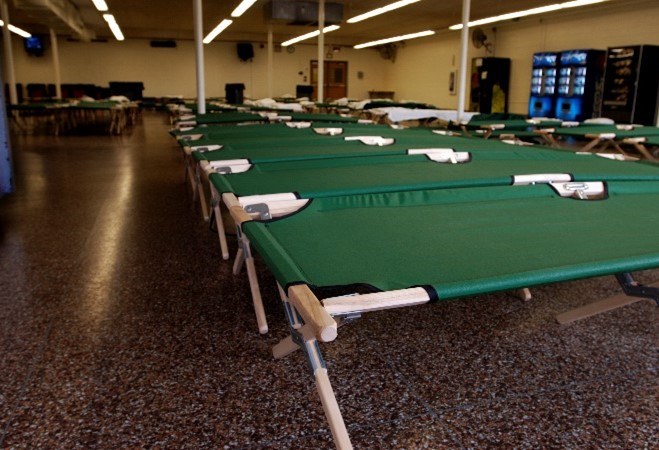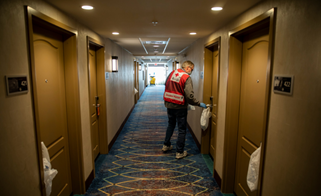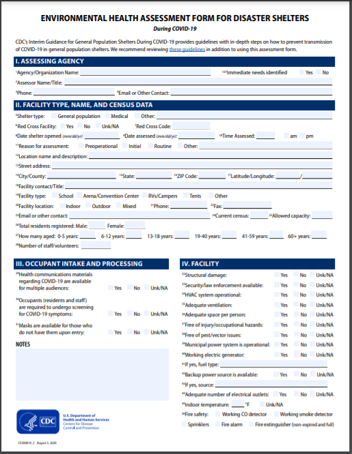Co-Authors: Kelsey McDavid, MPH, REHS; Miguel Cruz, PhD, MPH, CDC/ATSDR, and Emily D’Angelo, Program Analyst, National Association of County and City Health Officials.
In 2020, the COVID-19 pandemic was not the only disaster to strike the nation. Natural disasters, including wildfires, earthquakes, droughts, floods, and hurricanes, also affected the United States and its territories concurrently. In fact, the American Red Cross (ARC) reported in 2020, the organization provided over 1.2 million overnight shelter and hotel stays to people in need—more than four times an average year. A constant state of disaster readiness must exist to minimize delays in offering safe shelters to those affected and those caring for them. The 2021 Atlantic hurricane season begins June 1, and the threat for catastrophic storms or multiple natural disasters remains. At any moment, concurrent disasters could force communities into disaster shelters.
Disaster shelters are intended to provide a safe place from the direct effects of disasters. Disaster shelters can include congregate facilities (school gymnasiums, arenas, convention centers) and non-congregate facilities (tents, hotels, dormitories). These facilities are not immune to the potential effects of the damage and disruption caused during and after the disaster. As a result, they require monitoring.

Often, staying in a disaster shelter disrupts routine hygiene and sanitation practices as well as access to basic health services. Additionally, individuals in disaster shelters are in distress due to the nature of the incident(s) that forced them to evacuate their homes. Proximity to others and disruption of normal health care and sanitation creates conditions where potential outbreaks can occur, as have happened in the past. Since 2020, public health officials have had to consider yet another priority when assessing disaster shelters: preventing the spread of COVID-19.

At the start of the pandemic, in March 2020, in anticipation of shelter needs during COVID-19, the Centers for Disease Control and Prevention (CDC) and Agency for Toxic Substances and Disease Registry (ATSDR) developed the Environmental Health Assessment Form for Disaster Shelters During COVID-19 to assist health officials with following, maintaining, and assessing compliance with CDC recommendations for COVID-19. As the nation heads into 2021 National Hurricane Preparedness Week, health officials are reminded to think about how their regular operations can be adjusted to accommodate COVID-19 guidelines, especially around hygiene, sanitation, distancing, and medical isolation. This assessment form is a modified version of CDC’s original Environmental Health Assessment Form for Disaster Shelters initially released in 2008 and revised again in 2019. In comparison to the 2019 Assessment Form, this new, easily adaptable tool includes new variables, covers an additional domain, and provides more opportunities for users to take notes while utilizing the assessment form.

In addition to a downloadable PDF, this form can be accessed through Epi Info and Survey 123 for use on a mobile device, such as a tablet or phone, while in the field and can provide data analysis.
CDC has developed the following resources to support users of this tool:
- Instruction Sheet for the Shelter Assessment Form
- Audio Training (available in English, Spanish, and French)
- Fact Sheet (available in English, Spanish, and French)
- *Interim Guidance for General Population Disaster Shelters During the COVID-19 Pandemic
*It is recommended that public health professionals refer to this guidance before using the assessment form.
View many of these resources on CDC’s Emergency Preparedness and Response Webpage and other related resources on the Natural Disasters, Severe Weather, and COVID-19 Webpage.
If you registered for the National Association of County and City Health Officials’ 2021 Preparedness Summit, access a recording of a demonstration on this Shelter Assessment form through the Conference portal.
To share comments, questions, or feedback with the team at CDC, email [email protected].







